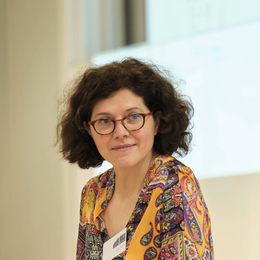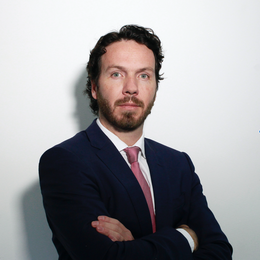Day 1
Registration opens
In-person participants will be able to register at the reception of the Blavatnik School of Government and enjoy tea, coffee and pastries with other in-person attendees and speakers.
Welcome to the Social Outcomes Conference 2024
The Government Outcomes Lab's leadership team will welcome online and in-person participants to this year's conference.
Find a recording of the event here.

Professor Ngaire Woods
University of Oxford
Keynote Discussion by Professor Tina Nabatchi
We are delighted that this year's keynote address will be offered by Tina Nabatchi, Joseph A. Strasser Endowed Professor in Public Administration and Director of the Program for the Advancement of Research on Conflict and Collaboration at the Maxwell School of Citizenship & Public Affairs, Syracuse University. She will draw on her decades of research on citizen participation, collaborative governance, conflict resolution and challenges in public administration to explore this year's conference theme of accountability, transparency & trust in cross-sector partnerships.
The keynote address titled "Of Clocks and Clouds: Addressing Public Problems in the 21st Century" will be followed by a panel discussion.
Find a recording of the event here.

Tina Nabatchi
Syracuse University

Dr Eleanor Carter
University of Oxford

Mario Calderini
Politecnico di Milano School of Management

Russell Jones
Southwark Council and SEL ICB

Dr Chih Hoong Sin
Independent

Dr Mara Airoldi
University of Oxford
Chair
Deep Dive 1.1 Strengthening partnerships for collaborative learning in outcomes-based financing for education projects
Outcomes-based financing (OBF) is emerging as an innovative financing approach in education aimed at enhancing effectiveness, accountability, and transparency in education programming. This panel discusses the critical role of collaborative learning amongst diverse actors in examining the opportunities and challenges of implementing OBF within the education sector.
Building strong partnerships among researchers, service providers, investors, and funders to engage in a collaborative learning process is an important avenue to enhance the global knowledge base on the complexities, challenges, and success of using OBF. Learning partnerships that foster open communication, trust, and collective meaning-making have the potential to better understand whether, how, and under what conditions the OBF approach is beneficial to improving education outcomes.
Featuring a diverse panel of researchers, service providers, investors, funders, and intermediaries, this discussion offers a comprehensive exploration of how diverse interests converge to provide equitable, inclusive, and quality education to all. Each panellist brings a unique perspective, enriching the discourse with their experiences and insights. The discussion will delve into the significant value that learning and research partnerships bring, the various models of engagement, the obstacles they face, and strategies to overcome these challenges. Furthermore, the discussion will focus on strengthening collaborative learning between different actors to benefit the global education community with a transparent knowledge repository on reflections and lessons learned on the use of OBF in education. The insights shared in the panel should be invaluable for stakeholders either considering OBF or who are already implementing education projects using OBF.
Find a recording of the event here.
Presentations
In 2024, the Royal Shakespeare Company launched the findings from its Paul Hamlyn Foundation-funded research project, Time to Act. The project’s randomised controlled trial measured the impact of RSC teaching …

Jacqui O'Hanlon
RSC

Dr Lynsey McCulloch

Dr Matthew Collins
RSC
The Education Outcomes Fund (EOF) is pioneering the use of outcomes funds for early childhood care and education (ECCE). Over the past two years, we have cultivated multi-stakeholder partnerships and …

Dr Özsel Beleli
EOF
The emerging outcome-based financing models in education have challenged education researchers to examine their influence on effectiveness, efficiency, and equitable provision in achieving the personal and societal aims of education …

Dr Vikas Maniar
TISS
UBS Optimus Foundation has been engaged with Outcomes Based Finance (OBF) since 2015 when we participated in the Educate Girls Development Impact Bond in India. UBS Optimus Foundation has since …

Sietse Wouters
UBS Optimus Foundation
Language and Learning Foundation (LLF) is a system-focused and impact-driven organization dedicated to improving foundational learning of children in early childhood education and primary schools. We collaborate with state governments …

Dr Dhir Jhingran
LLF
Deep Dive 1.2 Thinking big, thinking little: partnerships for climate and environmental impact at multiple scales
Climate change and environmental degradation present challenges on a global scale. The need to increase funding for environmental programmes and to maximise the impact of that funding, requires cross-sector coordination among states, international organisations, and the private sector. At the same time, environmental policy must adapt to specific places, their communities and contextual characteristics. The voices of citizens, civil society groups, and local co-creation become requirements for policy sustainability. This session will explore cross-sector partnerships for environment and climate policy at multiple scales. Key themes include: Global climate finance and the impact of investment; varying definitions and metrics for results; stakeholder engagement and co-creation of ‘green’ solutions; governance and administration to support multi-scale partnerships.
Find a recording of the event here.

Frances Pimenta
UK Government

Dr Harry Bregazzi
University of Oxford
Chair
Presentations
While climate finance is growing rapidly, it falls far short of the $3-6 trillion annual needs estimated by the World Bank to mitigate climate change impacts. It is thus critical …

Benjamin Stephens
Instiglio
The United States seeks to have a net zero greenhouse gas economy by 2050. Citizens as well as scientists, special interest groups including environmental justice groups are not afforded the …

Dr Patsy Kraeger
Chatham University

Dr Creed Tumlison
California State University
Sustainable development challenges include issues such as the consequences of climate change, inequalities in access to health and education, integration of immigrants and refugees, and several others which embody the …

Dr Benedetta Trivellato
University of Milano-Bicocca
Deep Dive 1.3 Benefits and challenges to outcome-based financing for health
In this session, we will take global stock of the landscape of outcome-based investments in health. We will then explore the experience of the benefits and challenges in this field, as well as the tried-and-true solutions to mitigate risks. This will be informed by international case studies in Europe, Australia, UK, and Netherlands. We will investigate key questions which have relevancy for any stakeholder interested in the area of health.
Key questions:
- What are the barriers to investing in health outcomes?
- What is the value-add of new funding types for achieving better health outcomes?
- How can we overcome the risks perceived by different actors in investing in health at the system-level?
Find a recording of the event here.

Prof Balazs Nagy
Syreon Research Institute & Invest for Health

Emily Hulse
University of Oxford
Chair
Presentations
Objectives: Many developed countries have fragmented mental healthcare systems that are costly and don't align well with patient preferences. To improve integration of care, insurers are exploring new payment methods …

Prof Henry Cutler
Macquarie University Centre for the Health Economy
While the importance of long-term investment in prevention and health promotion has been at the forefront of policy discussions for decades, the actual level of investment in this area still …

Stefánia Plankó
Syreon Research Institute & Invest for Health
In North Limburg (the Netherlands) 7 municipalities, 2 health insurers teamed up to pay for outcome with the health impact bond standing strong. The programme, worth €2,8 million, is funded …

Ruben Koekoek
Social Finance NL
Deep Dive 1.4 Beyond impact bonds: exploring new (and not-so-new) uses of outcomes-based contracting and impact investing
This session will explore innovative ways of working with outcomes-based contracts and impact investing. From the first impact bond lunched in 2010, many lessons have been learned and new tools developed to that builds and expand an outcomes mindset. In this session we will delve into a number of growth paths for the outcomes mindset, from the creation of an outcomes marketplace, to developing microbonds, to creating repositories and capacity-building tools for a broader portfolio of approaches that may be more appropriate in different contexts.
Find a recording of the event here.

Juliana Outes Velarde
University of Oxford

Royston Braganza
Grameen Impact Investments India

Dr Mara Airoldi
University of Oxford
Chair
Presentations
KOIS and Tiko are partnering to develop a new flexible and replicable financing model to fund the scale up of Tiko’s activities in its mature markets. To this end, we …

Serena Guarnaschelli
KOIS
The Village Enterprise Development Impact Bond spurred iteration to ensure success. While the project met and exceeded performance targets, the question arises: How can we foster innovation that transcends mere …

Celeste Brubaker
Village Enterprise
While the importance of long-term investment in prevention and health promotion has been at the forefront of policy discussions for decades, the actual level of investment in this area still …

Stefánia Plankó
Syreon Research Institute & Invest for Health

Prof Balazs Nagy
Syreon Research Institute & Invest for Health
Background: In many fragile contexts like Somalia, the coverage of essential health services is low. Different social accountability approaches were tested to address these challenges. Partnership Defined Quality (PDQ) is …

Dr Adam Abdulkadir
Save the Children
In Colombia, addressing the lack of measurement in government-implemented social programs has long been a challenge, impeding the assessment of their cost-effectiveness and transparent use of public resources. However, since …

Daniel Uribe
Fundación Corona
Deep Dive 1.5 Reaching marginalised communities and enhancing inclusion in outcomes-based service provision
Outcomes contracts are designed around measurable impact. This session asks ‘measurable impact for whom?’, and explores the difficulties of providing beneficial services for vulnerable and marginalised people. From programmes for disabled children, to refugees, to survivors of domestic abuse, we will critically reflect on initiatives to include and support vulnerable communities within outcomes contracts. Key themes include: incentives to enhance inclusion; trust and sensitivity between providers and service users; developing community-centric definitions of outcomes and impact.
Find a recording of the event here.
Presentations
The Refugee Transitions Outcomes Fund (RTOF) was a cross-Government initiative led by the Home Office, running from 2022 to 2024. The RTOF piloted new place-based approaches to supporting people with …

Tanyah Hameed
Social Finance
The NSW Government, through the Department of Education (DoE) and Office of Social Impact Investment (OSII), has partnered with five job-focused social enterprises to advance the economic wellbeing of women …

Lucy Barkl
NSW Treasury
This on-going thesis investigates how a culturally sensitive, community-based savings model can be developed for the ultra-poor in poverty alleviation interventions. The research context is a DIB funded BRAC graduation …

Nnamdi Okolo
University of Sheffield
This presentation will explore the puzzle of how an outcomes fund can be harnessed to support inclusive outcomes for all. In many contexts, including sub-Saharan Africa, disability inclusion in early …

Christopher Kurt Burningham
EOF
Deep Dive 1.6 Revolutionary, responsible, and responsive relationalism in public procurement
This session will delve into the public procurement professional's role in relational public contracting for innovation, sustainability and VCSEs. By exploring the intricate relationship between procurement practices and relational contracting, we will highlight how professionals might drive social value through collaborative and responsible partnerships.
Find a recording of the event here.

Saema Jaffer
UK Parliament

Kate Gough
Freshfields

Dr Ruairi Macdonald
Faculty of Law, University of Oxford
Chair
Presentations
The Czech Republic and Slovakia are the countries with the lowest share of green procurement in the European Union. At the same time, these two countries are among the most …

Prof Michal Plaček
Charles University
Public procurement is often used to invest in small and disadvantaged businesses (SDBs), both to help such firms grow and to advance marginalized communities. In the U.S., the federal government …

Dr Benjamin M. Brunjes
University of Washington
Governments and private partners often face unforeseen contingencies that make contract renegotiations unavoidable. This study leverages data from the Tender Electronic Daily eProcurement platform—based on European Union (EU) public procurement …

Professor Carolyn Heinrich
Vanderbilt University
There is increasing expectation for public procurement to deliver positive outcomes for society and the communities which public bodies serve. This emphasis on social value is not a new concept, …

Professor Jane Lynch
Cardiff University
BACKGROUND OF THE STUDY:
Intangible cultural heritage is often neglected in public procurement, but its inclusion can contribute to ensuring that local and cultural practices, expressions, knowledge, skills and traditions, …

Dr Carol Cravero
French Development Agency Group
Big Picture: Restoring trust in the public sector through outcome-based partnerships: transparency, relationality and adaptation
This year over half of the world’s population are heading to the polls for elections, yet governments are facing a crisis of confidence from their citizens. Restoring this trust requires governments to deliver results against a backdrop of what is being dubbed a ‘permacrisis’. What can be done to restore faith in the public sector? And what wider lessons might we learn from outcomes-based contracting to build and renew public sector capabilities, collaboration, and culture?
In this session, we will lift our gaze to these broader issues and ask:
- How can an outcomes-focus strengthen government capabilities through value for money and ensured impact of policies such as children's care, health, and homelessness?
- How might government meaningfully collaborate with other sectors to improve the delivery of public services?
- How might public services be strengthened with preventative spending, enabled through an outcomes-focus?
Find a recording of the event here.

Dr Joe Abah
DAI Global

Andrew Greenway
Public Digital

Dr Mekhala Krishnamurthy
Ashoka University

Alison Jeffrey
Department for Culture, Media and Sport (DCMS)

Dr Eleanor Carter
University of Oxford
Chair
The evolution of social outcomes partnerships in the UK: Distilling fifteen years of experience from Peterborough to Kirklees
The evolution of social outcomes partnerships in the UK: Distilling fifteen years of experience from Peterborough to Kirklees
Perspectives from across academia, policy and practice
Nearly fifteen years since the world’s first social impact bond was launched at HMP Peterborough in England, the impact bond model has been stretched and flexed to fund a growing array of social programmes across health, employment, education, social care and many more. Alongside this adaptation, we have also seen a shift in how this funding model is used and understood.
Yet for many beyond the immediate community working on these cutting-edge partnership projects, social impact bonds still equal the Peterborough SIB. This means that the understanding of the practice, potential and proof of impact of these innovative approaches remains fragmented and partial. Significant opportunities for public sector reform and systemic change will be missed as long as a fog of baffling terminology and mis-interpretation clouds how we see the role of outcomes and effective cross-sector in tackling the acute public services crisis the country faces.
This report brings together perspectives from across academia, policy and practice to take stock of UK’s experience with impact bonds over the past 15 years, to help inform and inspire best practice across the globe.

Professor Ngaire Woods
University of Oxford

Andreea Anastasiu
University of Oxford

Nick Hurd
GSG Impact

Michael Peoples
Kirklees Better Outcomes Partnership

James Magowan
CSY Directorate, DCMS
Enter access code
Submit the event access code to reveal the session/meeting credentials.

